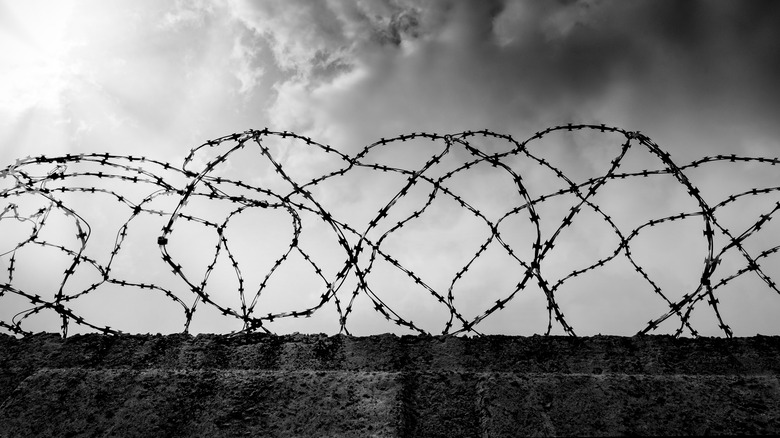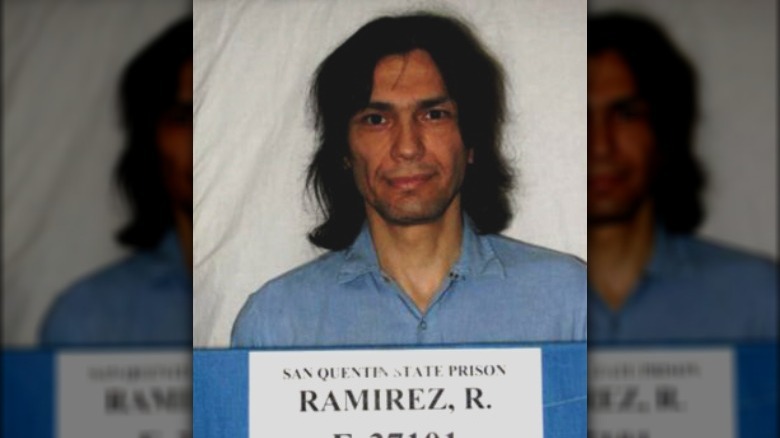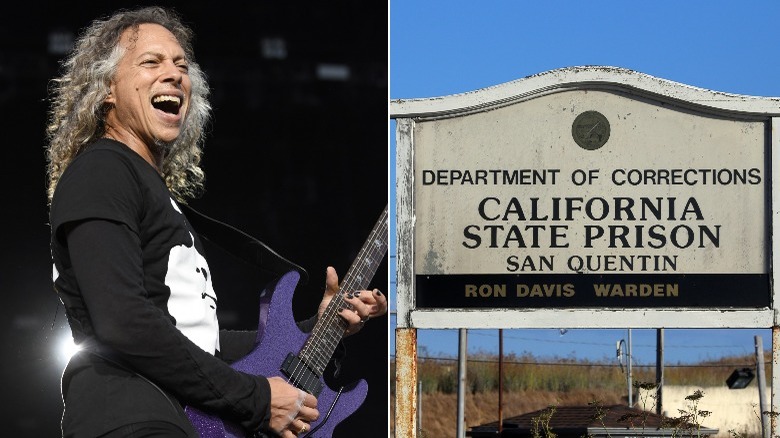The Iconic Band's Music Richard Ramirez Was Denied While On Death Row
It may be surprising, but some of the most iconic performances in the history of music happened in prisons. The performances ran the gamut of genres: The Sex Pistols performed at Chelmsford Top Security Prison in 1977, while blues legend B.B. King recorded a live album from Cook County Jail in Chicago. Frank Sinatra and the Count Basie Orchestra even performed in prisons on multiple occasions. However, the most iconic prison performances — by a significant margin too, which given the heavy hitters who have done it, is saying a lot — belong to Johnny Cash, who performed at both Folsom Prison and San Quentin State Prison, per Paste.
Of course, getting to see performances like those is nothing short of a privilege, especially for inmates serving time for all types of crimes. There were certainly prisoners left off the guest list, and in 2003, death-row inmate Richard Ramirez — better known as the "Night Stalker" — wasn't allowed to take part in a visit from thrash metal icons, Metallica (via NME).
The Night Stalker
In the mid-1980s, California was terrorized by a serial killer, rapist, and burglar who became known as the Night Stalker. At the time, it wasn't yet known that the perpetrator was Richard Ramirez, who killed his first known victim in 1984. There are then believed to have been eight months between Ramierez's murders, but in 1985 he ramped up his criminal acts to horrifying effect, according to Britannica.
The killings made front-page news, and the resulting fear caused a sharp increase in gun sales, as fearful citizens looked for protection. Ramirez's last known murder happened on August 30, 1985. Less than one week later, police released his name and photograph to the public, and after someone called in a tip, Ramirez was caught the next day (per Britannica).
Ramirez went to trial in 1989, which turned into a media circus, especially when the self-described Satanist showed up to court with a pentagram drawn on the palm of his hand. Ramirez was convicted of 13 murders and sent off to death row at San Quentin State Prison. He died in 2013, but 10 years before his death, he would miss out on a visit from Metallica.
Metallica at San Quentin
The year 2003 was a bit of a weird time for Metallica. The Rock and Roll Hall of Famers had faced a turbulent few years, which saw the departure of bassist Jason Newsted. A fly-on-the-wall documentary, called "Metallica: Some Kind of Monster," covered the internal band tension during this time, and also followed the recording of the band's 2003 album "St. Anger" (via The Guardian). The album wound up not being a favorite album — due to its lack of solos, the use of an unusual snare drum sound, and a raw songwriting and production style that saw the band trying to go back to their roots — but it led the band to San Quentin.
Metallica decided to shoot the music video for the album's title track "St. Anger" at San Quentin State Prison. Unlike the album, the video for "St. Anger" received significant acclaim, including a nomination for best rock video at the MTV Video Music Awards. According to an interview with Kerrang, guitarist Kirk Hammett recalled there being tension as the band played their song and shot their video in front of hundreds of prisoners. Hammett recalled the prisoners being appreciative of Metallica choosing to shoot their video at San Quentin, but Richard Ramirez was left disappointed.
Richard Ramirez sent a gift after not being allowed to see Metallica
Kirk Hammett recalled that one prisoner not allowed to attend the video shoot was Richard Ramirez. Still, the notorious killer was able to hear the band blasting their latest tune from inside his cell. However, he was angry that he couldn't be there in person.
"The guards who were responsible for watching him said Richard Ramirez was pissed off and pacing his cell because he wasn't allowed to see us," Hammett recalled in a 2022 interview with NME. "He gave the guards his subscription copy of a magazine with us on the cover and on the mail tag it said: 'Richard Ramirez, San Quentin Prison.' So that's my little token from Richard Ramirez. Not to glorify the guy — he did some horrible crimes."
In that same interview, Hammett wondered if he and Ramirez had crossed paths at some point in the 1980s, while he was still playing in Bay Area thrash band Exodus, before getting the call from Metallica. "He hung out in Richmond, California, and I wonder sometimes if me and the guys from Exodus were at the same parties as him back in the day," Hammett said.



